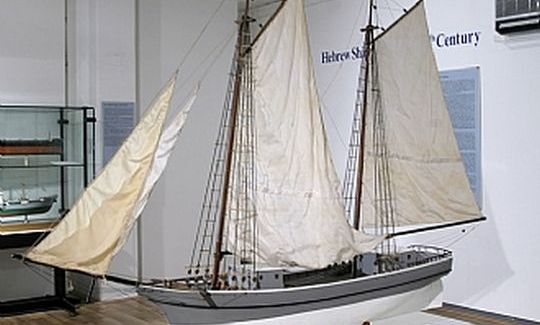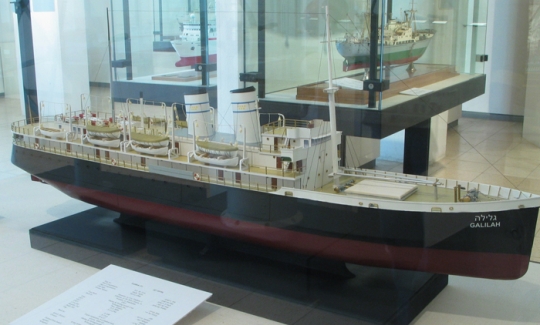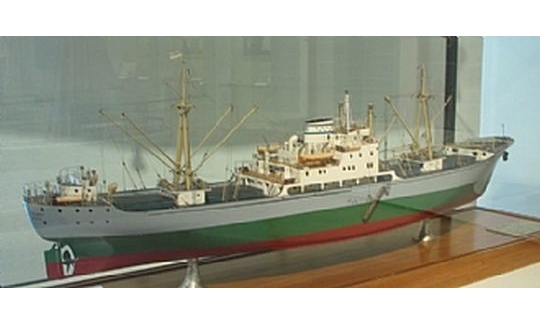Hebrew Shipping in the 20th century
Monday, 01.06.09, 10:00
Sunday, 09.06.24
:
Avshalom Zemer
More info:
04-6030800In his allegorical work "Altneuland", Theodore Herzl envisioned Haifa as a city with a large, busy port from which ships bearing an emblem of seven stars set out for all parts of the world. His suggestion for the national flag, which was not accepted by the national establishments, was adopted by the national maritime company when it was formed. Two of Herzl's associates had proposed creating such a company, but this proposal was rejected at the early Zionist congresses because the leaders disregarded the notion that the rise of a Jewish nation in its own land would require direct provision for working that land and to its agricultural settlements. Redeeming the land was the declared aim on which most of their efforts and resources were concentrated.
Hebrew seamanship was based on the Jewish establishment of the first Hebrew city of Tel Aviv. This, like the incremental number of settlements, villages and kibbutzim that were created after the First World War, necessitated importing vast quantities of building material. The initial dependency on Arab shipping was problematic because of constant strikes, disorganized shipping lines and, above all, the beginning of the Arab uprising and hatred of the Zionist ideal. To respond to the urgent need to serve the Jewish settlers, initiatives were taken by those who had acquired much maritime experience in their countries of origin, among them adventurers and contractors, who initiated Israel's first shipping companies. Essentially, these companies were intended for passenger and goods transport, and for fishing. Some of these attempts were doomed to failure from the outset. Halutz (Pioneer) was the first vessel owned by Jews, acquired in 1919 by a Jew who had dreams but no maritime experience, which was wrecked after a short time. Hetz (Arrow), a Scandinavian fishing vessel acquired in 1928, was totally unsuitable for fishing in the Eastern Mediterranean. The worst failure was the loss of the Emanuel, acquired communally as the basis for forming a company, which was lost with all hands while sailing from England to Greece in 1934. However, there were also some successes, and in 1928 the first Israeli captain, Zeev Hayam, was given command of the Gozal (Chick), a cargo boat belonging to the Nesher Cement Company. In 1926 Hayam was a member of a sailing group on the River Yarkon. For many years afterwards he was a very active seafarer, connected both to the Jewish settlement and to the State of Israel. The Dizengoff Company was founded during the Turkish regime, and in 1934 the Atid company was established, an effective outlet for Jewish naval students who would man vessels in companies established later, and in the illegal immigrant ships and the navy.
In 1932, David Ben-Gurion called for "conquering" the sea "as a way to increase the size of our country, to establish our economic infrastructure, to support the creation of our nation, to affirm our political status, for expansion, and to dominate the mighty forces of nature". Ben-Gurion's vision was of an established trading and fishing fleet, indivisible from the Jewish settlement of Israel, an economic link with the rest of the world. He also envisioned the construction of a port at Eilat many years before this concept was implemented. In 1935, the Jewish Agency created a maritime department according to the decision taken at the 19th Zionist Congress. It was intended to deal with fishing and the maritime needs of the Jews of Palestine, and to be the official representative of these matters under the British Mandate. The head of the department, Bar-Kochba Meirowitz, with Ben-Gurion's support, undertook the foundation of the national shipping company Zim, which was started at the end of the Second World War.
During the 1950s there was great expansion in the development of Israeli shipping, partly due to reparations received from Germany. Ships were both given as direct payment or commissioned and paid for with these funds. Sometimes the reparations were used as government guarantees for acquisition of vessels by private companies, and Zim also expanded. Other shipping companies, including Ophir, Sommerfein, El-Yam, Tarshish-Sela, Offer Brothers, and The Maritime Fruit Carrier were established. The decade 1965-75 was a difficult time for international shipping, especially for Israeli shipping, which had to cope with such problems as the sharp drop in payments for transport, fierce competition, air passenger services, the fuel crisis of 1973-74, and the changeover to container shipping. Companies that did not adapt to the new reality failed. Others were compelled to make wide-ranging changes. The Israeli fleet was among the first to adopt the container system. The ships were manned by mariners from the Third World, who required lower wages. Today, work agreements mandate the services of an Israeli captain and at least six Israeli officers on any vessel flying the Israeli flag.
Most of the vessels sold by the failed companies were acquired by Zim, which is currently owned by the Offer Brothers, considered to be one of the foremost shipping companies in the world, both because of its widespread activities, and because of the quality and size of its vessels. Poor profits and fierce competition in today's markets have decreased the number of shipping companies, but the stronger firms with experience in special assignments have risen to the challenge, including Gedot Yam which transports chemicals. Passenger transport has become tourism, and is also considered as a branch of expertise.
Recent years have been characterized by an impressive growth in the number of modern vessels, able to carry up to 5000 containers and first used by Zim. This company is currently in the process of commissioning and construction at the Hyundai shipyards in South Korea, the largest in the world.




